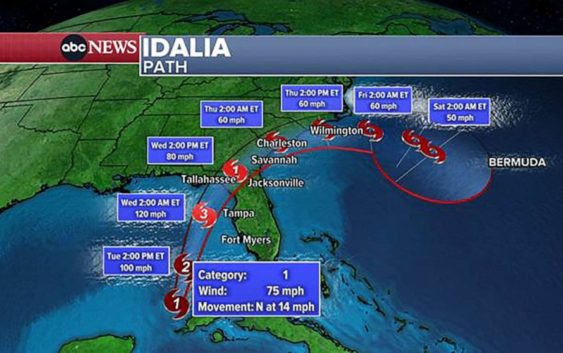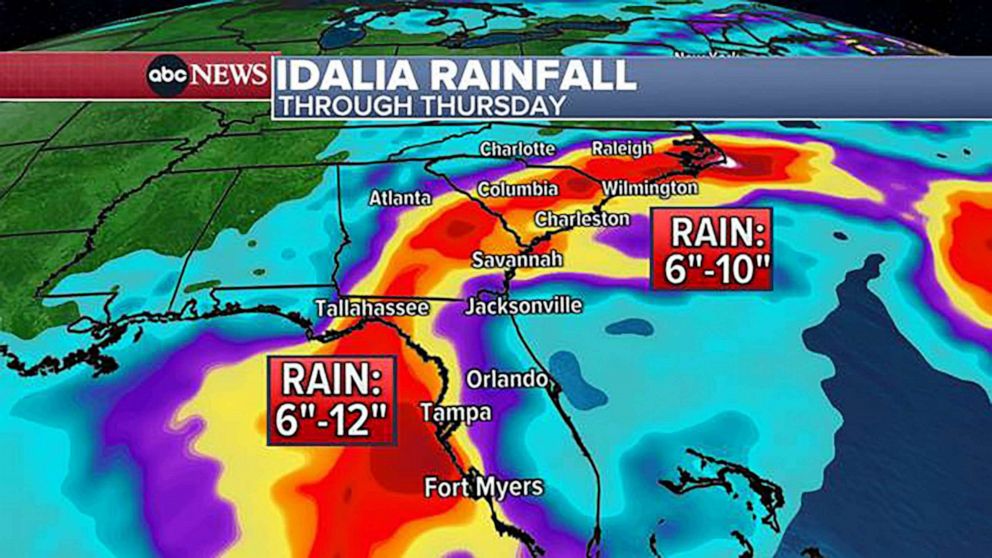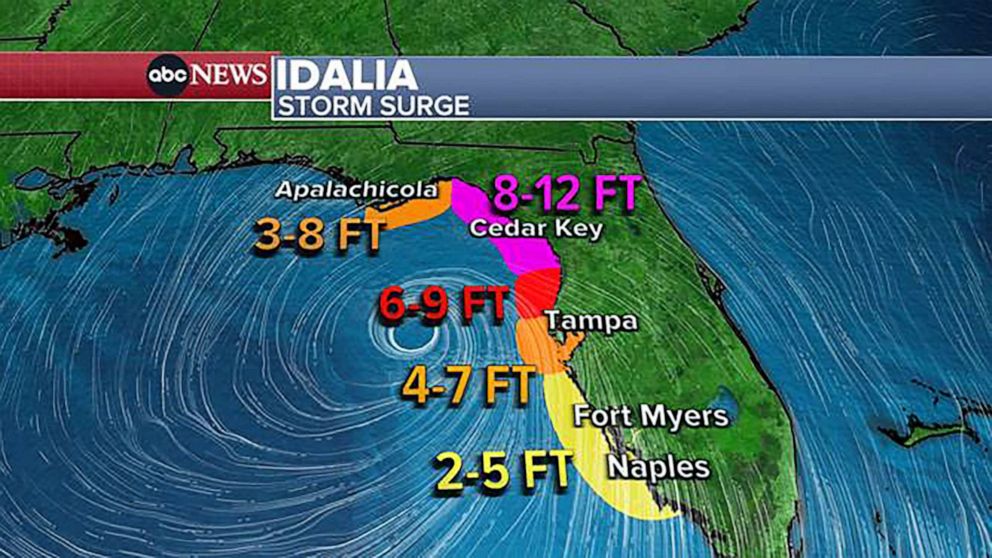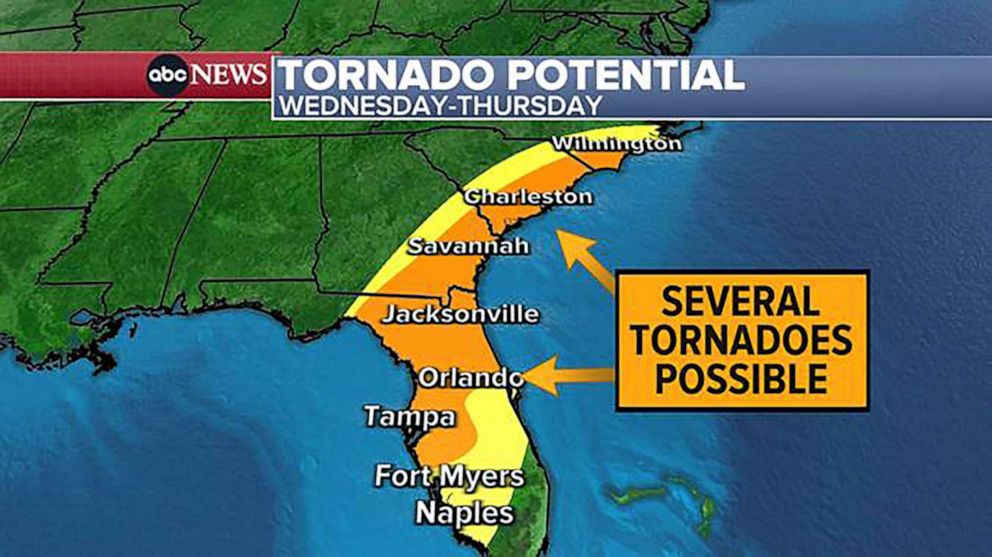- Western NC wildfire risk will 'get worse, not better' Ag Commissioner says, pressing lawmakers for help
- Watering trees is a must to protect them from severe weather and drought
- At least 4 dead, hundreds rescued after deadly floods ravage South Texas
- Today on Texas Standard: Deadly floods swamp South Texas, shatter records
- North Carolina radio station was a critical lifeline after Hurricane Helene. Then it became the voice of recovery.
Idalia strengthens to a hurricane, dangerous storm surges are forecast for Florida's Gulf Coast

MIAMI — Much of Florida was in disaster mode on Tuesday with only hours to go before an onslaught from Idalia, forecast to strengthen rapidly into “an extremely dangerous major hurricane” before hitting the Gulf Coast on Wednesday.
Florida residents loaded up on sandbags and evacuated from homes in low-lying areas along the Gulf Coast to prepare for a storm that the National Hurricane Center projected could have sustained winds of up to 120 mph (193 kph). That would make it a Category 3 hurricane — a potentially big blow to a state still dealing with lingering damage from last year’s Hurricane Ian.
“You still have time this morning to make your final preparations … but you gotta do that now.” Gov. Ron DeSantis announced at the state’s emergency operations center. Tolls have been waived on highways out of the danger area, shelters have opened, hotels are prepared to take evacuees and more than 30,000 utility workers are being staged to make repairs as quickly as possible in the hurricane’s wake, he said.
“You do not have to leave the state. You don’t have to drive hundreds of miles. You have to get to higher ground in a safe structure. You can ride the storm out there, then go back to your home,” DeSantis said.
At 8 a.m. EDT Tuesday, Hurricane Idalia was about 320 miles (515 kilometers) south-southwest of Tampa, with maximum sustained winds of 80 mph (130 kph), the hurricane center said. Idalia was moving north at 14 mph (22 kph).
The center of Idalia will most likely hit a lightly populated area of the Gulf Coast known as the Big Bend before crossing the peninsula and drenching southern Georgia along with the Carolinas on Thursday, forecasters said.
“Right now, the biggest hazards are storm surge,” Robbie Berg, a senior hurricane specialist at the National Hurricane Center in Miami, said Tuesday morning. “We’re expecting a surge as much as 8 to 12 feet above normal tide levels in portions of the Big Bend area of Florida.”
Idalia thrashed Cuba with heavy rain, especially in the westernmost part of the island, where the tobacco-producing province of Pinar del Rio is still recovering from the devastation caused by Hurricane Ian. Residents were evacuated to friends’ and relatives’ homes as up to 4 inches (10 centimeters) of rain fell, meteorological stations reported.
Idalia is the first storm to hit Florida this hurricane season, but only the latest in a summer of natural disasters, including wildfires in Hawaii, Canada and Greece; the first tropical storm to hit California in 84 years, and devastating flooding in Vermont.
“Just got to prepare for these things, hope for the best, and prepare for the worst and, you know, hunker down, as they say,” said Derek Hughes as he waited to load up his car with sandbags at a city park in Tampa.
DeSantis declared a state of emergency in 46 counties, a broad swath that stretches across the northern half of the state from the Gulf Coast to the Atlantic Coast. The state has mobilized 1,100 National Guard members, who have 2,400 high-water vehicles and 12 aircraft at their disposal for rescue and recovery efforts.
Tampa International Airport and St. Pete-Clearwater International Airport said they would close on Tuesday, and the Sunrail commuter rail service in Orlando was being suspended.
With a large stretch of Florida’s western coast at risk for storm surges and floods, evacuation notices have been issued in 21 counties with mandatory orders for some people in eight of those counties. Many of the notices were for low-lying and coastal areas, people living in structures such as mobile and manufactured homes, recreational vehicles and boats, and for people who would be vulnerable in a power outage.
In Levy County, officials said residents of Cedar Key must be off the island by Tuesday evening because storm surges would make bridges impassable.
“Once the storm surge comes in, help may not be available to reach you,” the county said in a public advisory.
Many school districts along the Gulf Coast said they would be closed Tuesday and Wednesday. Several colleges and universities said they would close their campuses on Tuesday, including the University of Florida in Gainesville.
“They told us that our dorm building, especially, is prone to flooding,” said Erin Amiss, a student at Eckerd College in St. Petersburg.
MacDill Air Force Base, located on Tampa Bay, is preparing to evacuate several aircraft and began a mandatory evacuation Monday morning for personnel who live in local counties, the Air Force said in a statement.
Tampa resident Grace Cruz, who has lived in the state for more than 40 years, put away patio furniture, filled her car up with gas and loaded up on sandbags. She worried about the tens of thousands of new residents to Florida who had never before experienced a hurricane, and she had some advice for them.
“If you’re planning to get away, you start ahead of time because of the traffic,” Cruz said. “No kidding. It’s horrible.”
As Gulf Coast residents packed up their cars or hauled out generators in case of power outages, state officials warned about potential fuel contamination at dozens of gas stations.
President Joe Biden told the Florida governor that he had approved an emergency declaration for the state, the White House said in a news release. DeSantis is running for the Republican presidential nomination in 2024.
Southwest Florida is still recovering from Hurricane Ian, which was responsible last year for almost 150 deaths. The Category 5 hurricane damaged 52,000 structures, nearly 20,000 of which were destroyed or severely damaged.
The National Oceanic and Atmospheric Administration recently said the 2023 hurricane season would be far busier than initially forecast, partly because of extremely warm ocean temperatures. The season runs through Nov. 30, with August and September typically the peak.
___
Associated Press contributors include Kathy McCormack in Concord, N.H., Julie Walker in New York; Sarah Brumfield in Silver Spring, Maryland; Cristiana Mesquita in Havana; Mike Schneider in St. Louis, Missouri; and Lisa Baumann in Bellingham, Washington.


